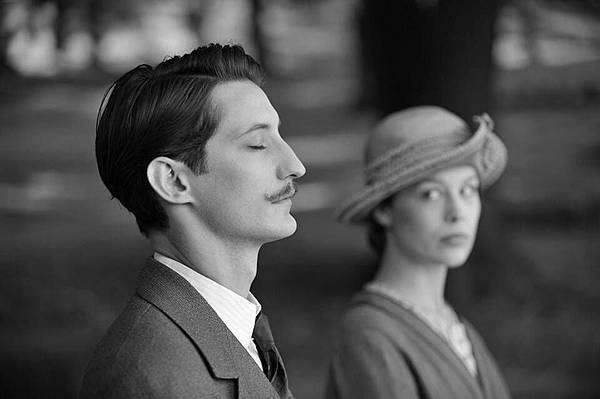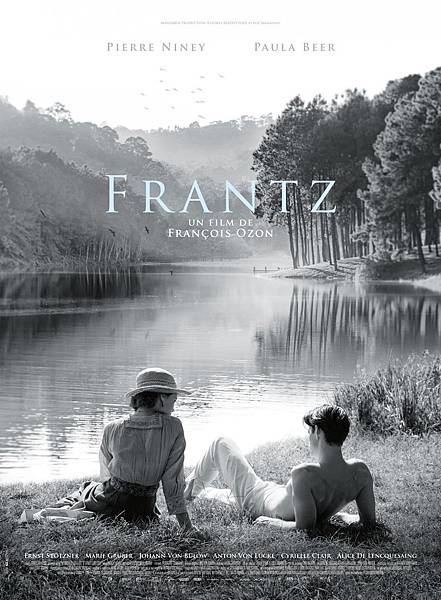Review: ‘Frantz,’ a Mysterious Frenchman and the Wounds of War
STEPHEN HOLDEN, The New York Times, March 14, 2017
https://mobile.nytimes.com/2017/03/14/movies/frantz-review.html?referer=http%3A%2F%2Fm.facebook.com%2F
accessed May 28, 2017
許久未看過如此情節引人如勝又細膩感人的佳片。故事發展至少轉彎七次。背景是一次大戰後的德國法國。劇本根據1932的老電影。我們仍可感受到19世紀20世紀初期那"美好時代"(la belle epoch)歐洲社會的教養,人際互動的內斂。
非常推薦這部難得的佳片。
林中斌 2017.5.29
It is gently and sensitively made. It moved me many times during the course of the showing. What makes it stand out from the similar movies is its intriguing development with at least seven turns of the story. Surprise after surprise and more to come. It is a film that touches my soul in way that has not occurred for a long time.
Chong-Pin Lin May 29, 2017


Can carefully constructed lies heal the emotional wounds of war? That unsettling question goes to the heart of “Frantz,” François Ozon’s sleek, somber adaptation of Ernst Lubitsch’s 1932 antiwar film, “Broken Lullaby,” set in Germany and France in the aftermath of World War I.
I won’t reveal the lie that propels the story except to say that it’s a whopper: a big one invented to comfort the aggrieved at a moment when the Great War seemed to have undermined the sanity of a world thrown into chaos by mass slaughter.
For an antiwar film, “Frantz” is low-key. It doesn’t rub your face in gore or stir your adrenaline; there are no battle scenes, and only fleeting images of ruined cities and wounded soldiers; and a mood of bitterness, despair and exhaustion prevails. The movie even goes out of its way to evoke the cultural similarity of two warring nations, geographical neighbors, who appreciated the same music and art. Parallel scenes show Germans and Frenchmen bellowing patriotic anthems even after the Armistice.
The title character (Anton von Lucke), seen in flashback, is a handsome German in his 20s who died in the trenches and is memorialized throughout the movie. You feel the anguish of his parents, Hans and Magda Hoffmeister, a doctor and his wife in Quedlinburg, Germany, and his depressed fiancée, Anna (Paula Beer), who lives with them. Another mourner, unknown to them, is his French friend Adrien (Pierre Niney). A willowy mustached French soldier with doe eyes and a timid manner who traveled from Paris to Germany, this mysterious stranger is first spotted by Anna while laying flowers at Frantz’s grave.
As they converse, Adrien recalls a close friendship that began in Paris before the war, in which the two often visited the Louvre. Both played the violin, and this being an Ozon film, where the possibility of romantic attraction is always in the air, the movie leads you to wonder if they were lovers.
Anna is so touched by Adrien that she brings him home to meet the Hoffmeisters, but Hans resists accepting him. “Every Frenchman is my son’s murderer,” he declares, then softens when Adrien tells him about his and Frantz’s long walks and museum visits, their shared pacifism and tastes in music and poetry. Hans relents, and as the days pass, Adrien becomes a surrogate son whose recollections bring the couple consolation.
In its early scenes, “Frantz” sustains the mood of a solemn, romantic period piece whose dignified melancholy is deepened by Philippe Rombi’s Mahler-influenced soundtrack, sighing discreetly in the background. At crucial moments, this mostly black-and-white film breaks into color. The first blush occurs when Adrien mentions Frantz’s favorite canvas, a Manet painting of a man with his head thrown back. When that work is finally shown, it depicts a young man’s suicide. By the time Adrien returns to Paris, he and Anna have developed a deep unvoiced attraction.
“Frantz” takes pains to show both sides’ lingering hostility after a devastating and (the movie implies) senseless war. In a powerful antiwar diatribe, Hans scolds a collegial gathering of fathers who lost their sons in battle. “Who killed your boys? Who sent them to the front?” he asks accusingly. “We did: their fathers. We are responsible.”
“Frantz” soon makes a sharp departure from “Broken Lullaby,” with Anna assuming center stage, and the movie taking on the tone of an Alfred Hitchcock mystery. After one of her letters to Adrien is returned without a forwarding address, she boards a train to Paris, hoping to find him. As if shedding a skin, the film shucks off its elegiac, white-gloved manners to explore a slippery realm of secrets, lies and moral uncertainty that eventually leads her to consult a priest for advice on how to proceed. The scene poses profound questions about honesty and the possibility for redemption if the truth is withheld.
In its second and weaker half, the film becomes a modernist fable, a kind of multiple-choice question that, in the light of today’s ambiguous moral climate rife with terms like truthiness, alternative facts and fake news, throws the past into shadowy half-light.
In the language of T. S. Eliot, “Humankind cannot bear very much reality.” That might be amended, substituting “the truth” for reality.


 留言列表
留言列表


